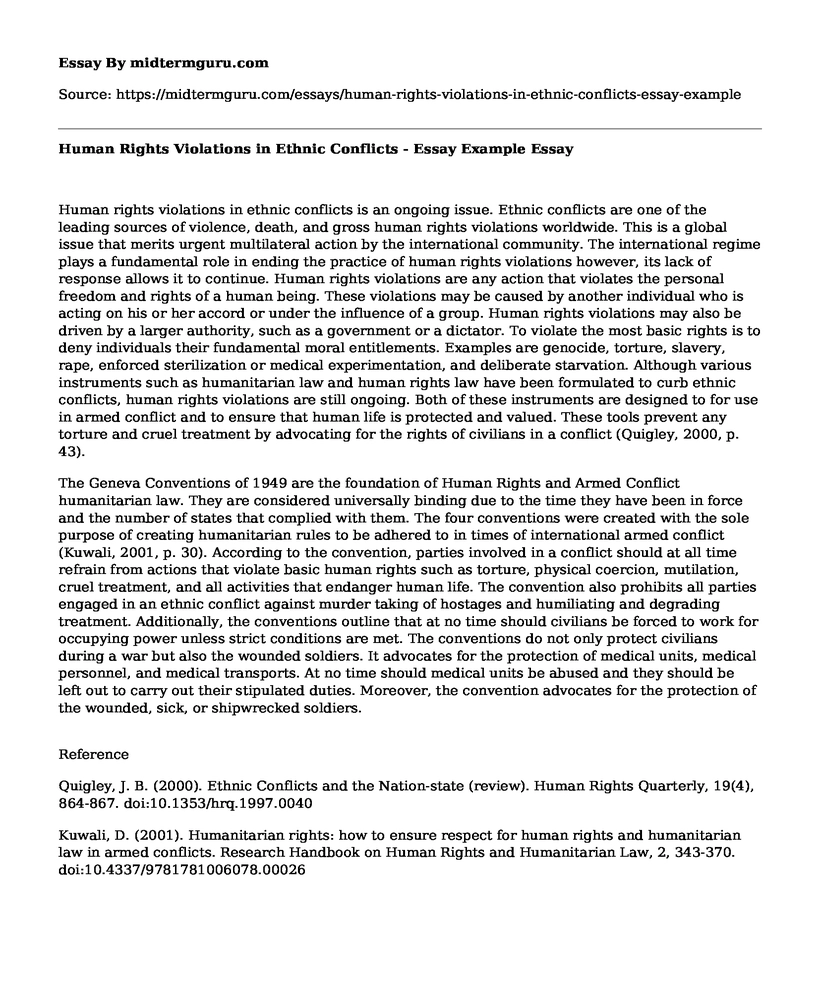Human rights violations in ethnic conflicts is an ongoing issue. Ethnic conflicts are one of the leading sources of violence, death, and gross human rights violations worldwide. This is a global issue that merits urgent multilateral action by the international community. The international regime plays a fundamental role in ending the practice of human rights violations however, its lack of response allows it to continue. Human rights violations are any action that violates the personal freedom and rights of a human being. These violations may be caused by another individual who is acting on his or her accord or under the influence of a group. Human rights violations may also be driven by a larger authority, such as a government or a dictator. To violate the most basic rights is to deny individuals their fundamental moral entitlements. Examples are genocide, torture, slavery, rape, enforced sterilization or medical experimentation, and deliberate starvation. Although various instruments such as humanitarian law and human rights law have been formulated to curb ethnic conflicts, human rights violations are still ongoing. Both of these instruments are designed to for use in armed conflict and to ensure that human life is protected and valued. These tools prevent any torture and cruel treatment by advocating for the rights of civilians in a conflict (Quigley, 2000, p. 43).
The Geneva Conventions of 1949 are the foundation of Human Rights and Armed Conflict humanitarian law. They are considered universally binding due to the time they have been in force and the number of states that complied with them. The four conventions were created with the sole purpose of creating humanitarian rules to be adhered to in times of international armed conflict (Kuwali, 2001, p. 30). According to the convention, parties involved in a conflict should at all time refrain from actions that violate basic human rights such as torture, physical coercion, mutilation, cruel treatment, and all activities that endanger human life. The convention also prohibits all parties engaged in an ethnic conflict against murder taking of hostages and humiliating and degrading treatment. Additionally, the conventions outline that at no time should civilians be forced to work for occupying power unless strict conditions are met. The conventions do not only protect civilians during a war but also the wounded soldiers. It advocates for the protection of medical units, medical personnel, and medical transports. At no time should medical units be abused and they should be left out to carry out their stipulated duties. Moreover, the convention advocates for the protection of the wounded, sick, or shipwrecked soldiers.
Reference
Quigley, J. B. (2000). Ethnic Conflicts and the Nation-state (review). Human Rights Quarterly, 19(4), 864-867. doi:10.1353/hrq.1997.0040
Kuwali, D. (2001). Humanitarian rights: how to ensure respect for human rights and humanitarian law in armed conflicts. Research Handbook on Human Rights and Humanitarian Law, 2, 343-370. doi:10.4337/9781781006078.00026
Cite this page
Human Rights Violations in Ethnic Conflicts - Essay Example. (2021, Jun 07). Retrieved from https://midtermguru.com/essays/human-rights-violations-in-ethnic-conflicts-essay-example
If you are the original author of this essay and no longer wish to have it published on the midtermguru.com website, please click below to request its removal:
- Essay on Multiculturalism in Workplace: My Experience of Interacting With People From Different Ethnic Communities
- Paper Example on Municipal Courts Slam the Poor Hardest
- A Lawful Order - Essay Sample
- Paper Example on Business Law: E-mails as Contracts
- Essay Sample on Research in Criminal Justice
- Essay Sample on Youth in a World of Gangs: How Are the Youth Experiences in a World of Gangs?
- Should Marijuana Be Legalized? - Essay Sample







